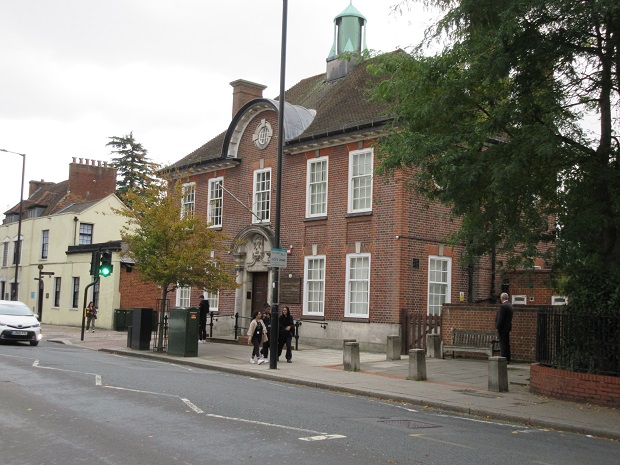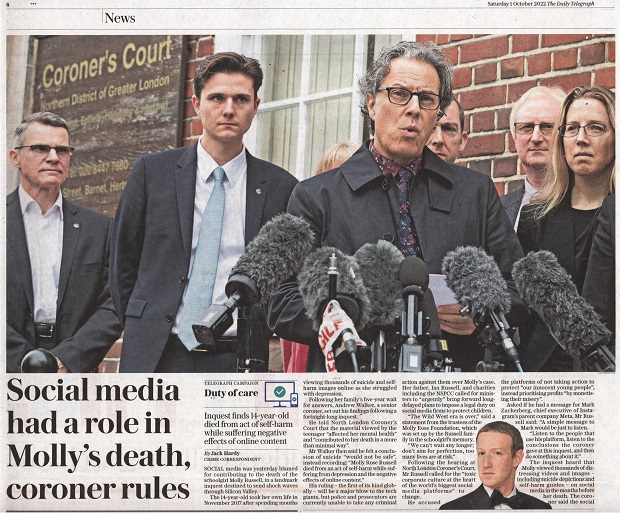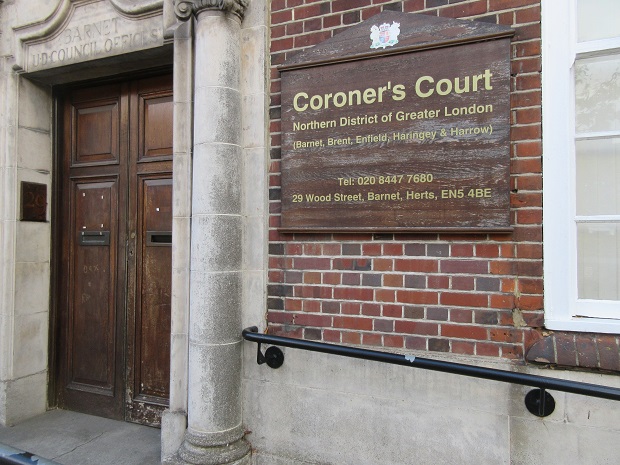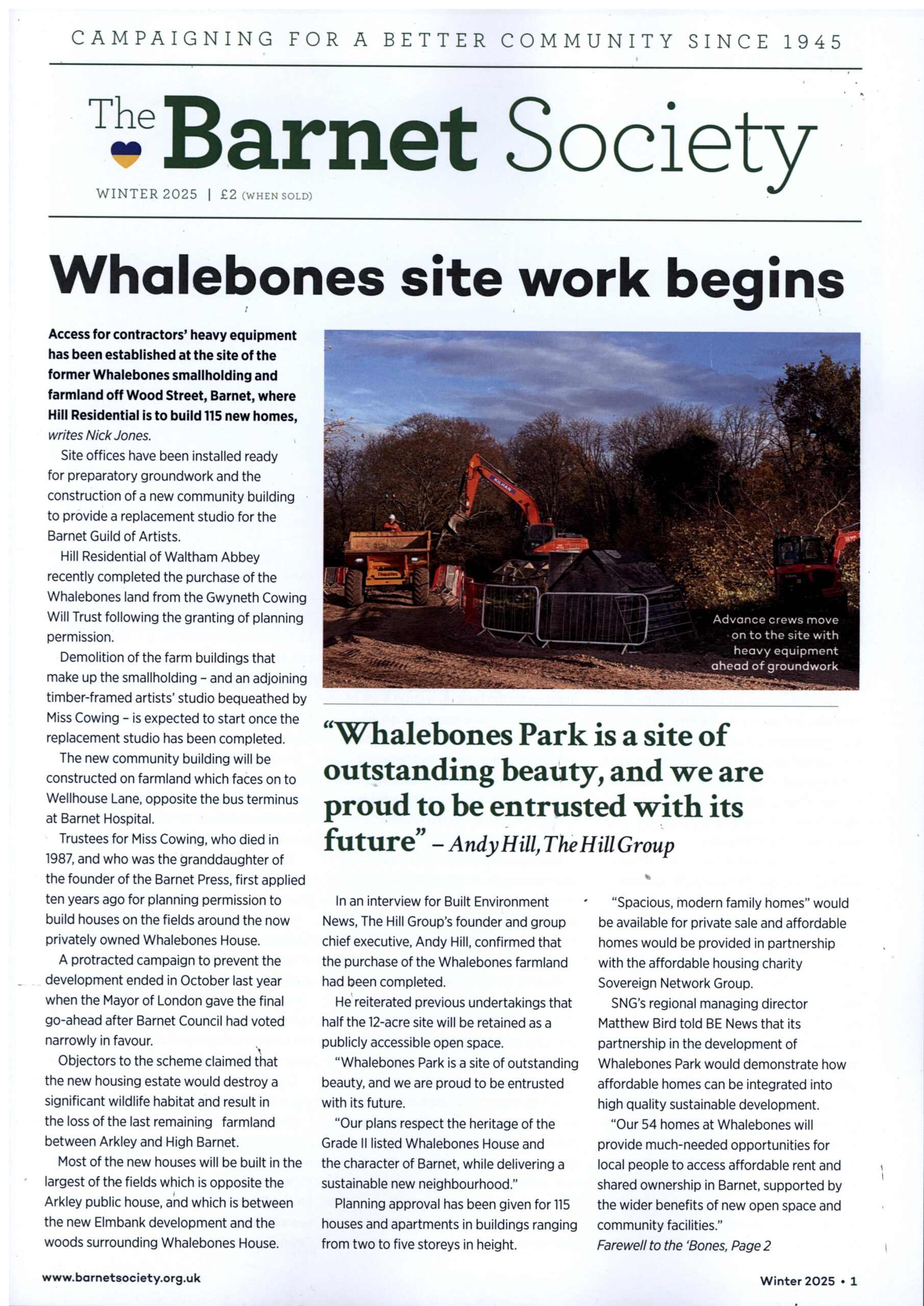Images of Chipping Barnet’s historic town centre feature in newspaper reports and television news bulletins

Barnet’s former town hall, which is now the North London Coroner’s Court, has been a backdrop for television news reports and press photographs that have gone round the world.
It was the setting for a landmark verdict warning social media firms of their responsibility to take drastic action to improve online safety for children and young people.
The coroner’s ruling after a two-week hearing into the circumstances surrounding the death of a 14-year-old schoolgirl — and hours of graphic evidence about the impact of social media posts linked to self-harm, depression and suicide — was said by media commentators to have sent “shock waves through Silicon Valley”.
Day after day a succession of doorstep news conferences and reporters filing their reports to camera filled the pavement in front of the old town hall, which is at the centre of Barnet’s historic Wood Street conservation area.
Although proceedings at inquests are inevitably sad occasions for those involved, and can be especially distressing for relatives, the continued use of the building for public benefit is to be welcomed.
It illustrates how former council offices can be re-purposed rather than converted into flats or demolished. For many years it served as the local registry office for weddings — the photographers then were taking pictures of happier occasions with confetti strewn around on the pavement.
On most days during the recent inquest, news bulletins carried reports from Barnet, often backed up with live interviews. While correspondents were being interviewed or being filmed for their pieces to camera, the bustle of Wood Street was clearly visible in the background.

Microphones were lined up at the entrance to the court when Ian Russell, father of Molly Russell, emerged to give his reaction to the verdict of senior coroner Andrew Walker that material posted on social media had contributed to his daughter’s death. (Photograph, Daily Telegraph, 1.10.2022)
Molly had spent months viewing thousands of suicide and self-harm images online as she struggled with depression.
Mr Walker concluded that material viewed by Molly had “affected her mental health” and “contributed to her death in a more than minimal way”.
Instead of a suicide verdict, the coroner recorded that she “died from an act of self-harm while suffering from depression and the negative effects of online content”.
There have been other high-profile cases at the coroner’s court – inquests into the death of Mark Duggan, who was shot by Police in Tottenham in August 2011, and “Baby P” whose brutal death in 2008 became headline news and led to criticism of Haringey social service.

The iconic former town hall, which is opposite Barnet parish church of St John the Baptist, was taken over as premises for the North London Coroner’s Court in 2019 and serves five North London boroughs.
Originally it was the main offices of Barnet Urban District Council which in 1965 was merged with other nearby local authorities to create the London Borough of Barnet.
While it remained in under the control of the Borough of Barnet, the former town hall continued to be used as an office for the registrar of births, marriages, and deaths.
Many married couples will have fond memories of the building which became a popular registry office.
The favourite spot for post-wedding photos was at the rear of the town hall, at the top of the Court House recreation ground.
Newly married couples stood there with friends and relations with the tower of the parish church and the Barnet townscape providing an appealing backdrop.
Historians and family history enthusiasts will find no shortage of interesting information just inside the front door.
The entrance is lined with wooden frames filled with long lists of names painted in gold print.
On display are the names of the chairmen of Barnet Local Board (from 1863 to 1894); East Barnet Urban District Council (from 1895 to 1965); and Barnet Urban District Council (from 1894 to 1965).
1 thought on “Images of Chipping Barnet’s historic town centre feature in newspaper reports and television news bulletins”
Comments are closed.


It’s a great shame that people can’t still be married there.